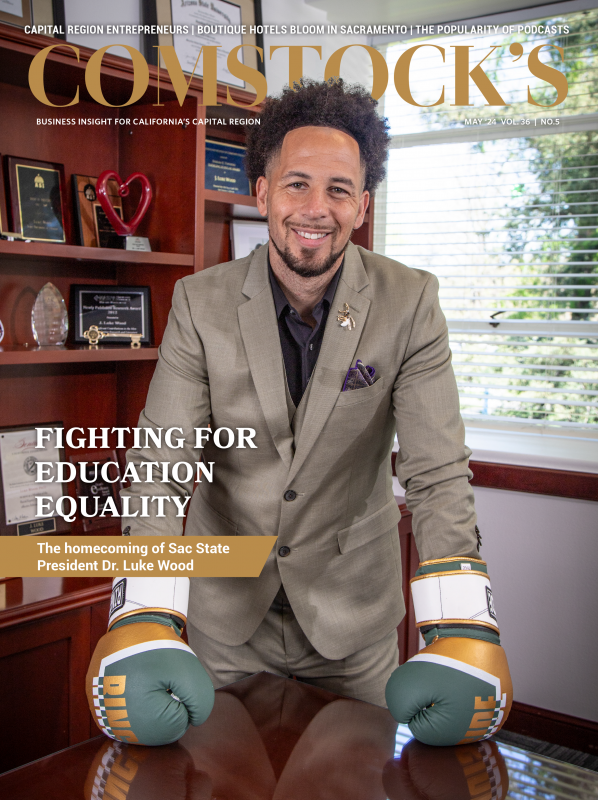Early each morning, Dr. Luke Wood — who was appointed president of Sacramento State University last year after many years at San Diego State University — gets up, heads to the gym and trains for his sporting passion, boxing. Each weekend, he spars in the ring.
“I don’t do it to be second best,” he says matter-of-factly, sitting in his second-floor office in Sacramento Hall, which is adorned with several football helmets perched on the windowsills. He is wearing a natty dark green suit, an open white shirt and green sneakers, his ankle socks barely protruding above the top of the shoes. “I love to box above my weight class. I tend to be achievement oriented and want to get things done.”
From the time he was a small child, Wood has always had a passion for competition, vying with his identical twin brother, Josh, as to who was the best skier, who was the fastest runner, who could score the most baskets in a basketball game and so on. “I’ve always been able to run long distances, run long and run hard,” says Wood.
“We’re both super competitive,” explains Josh, CEO of Sacramento Region Business Association, as we talk in an art-filled office in Midtown at the I Street Public Affairs company in which he is a partner. For Josh, his brother’s academic trajectory has been something remarkable to watch. “He’s incredibly published, incredibly prolific in the number of books” he has written, Josh says. “He was the youngest endowed chair in the country.”
Luke Wood’s friend Urijah Faber, owner of the internationally known Ultimate Fitness gym, which trains people from around the world in combat sports and is situated on Folsom Boulevard adjacent to the university’s campus, can attest to Wood’s skills as a fighter. “He came in and got a membership and started boxing,” Faber recalls. “I did a private lesson for him. Man, this guy can really punch. He hits like a truck. He’s very good. I have to have my defenses up. He’s a very competitive guy.”
Now, as Sac State president, Wood has set his competitive sights on remaking his university into an institution that can compete academically, not just with other CSUs — he is clear in his ambition to make the beautiful, tree-filled and ethnically diverse campus the flagship university in the CSU system — but with the University of California campuses and other top-tier institutions around the country.
Wood, who opened his tenure as president by embarking on what he called “100 days of listening,” wants to make the campus the first in the country to fully integrate combat sports into its athletic department, working with Faber to create a sub-unit called Combat U, which he hopes will draw students from around the world. Later this year, his campus will host a boxing match with UC Davis.
Beyond sports, Wood has put the university’s weight behind building a large-scale support network, known as Guardian Scholars, for hundreds of students coming up through the foster care system. He also established a first-of-its-kind Black Honors College within the campus for students seeking to immerse themselves in African American history and culture, and has ambitions to make the university a hub for artificial intelligence, engineering and sustainable transport research.
Dr. Luke Wood in the president’s office in Sacramento Hall. He
prefers stylish sneakers to dress shoes, and even wore them to a
recent meeting at the White House.

Years in the making
Luke Wood’s colleagues are impressed but not surprised by the scale of his plans for the university. Brother Josh and others who knew Luke when he was a student at Sac State remember how Luke repeatedly boasted he was going to be president of the university one day.
“I’ve known Luke since he was a student in my master’s class. He stood out as a student then, and he has not disappointed,” says Dr. Carlos Nevarez, interim provost and vice president for academic affairs at Sac State.
Twenty years ago, Nevarez was so taken with the young Luke Wood and his research into how to generate new, equity-minded leaders in higher education institutions that he asked whether Wood would co-author some books on the topic with him. Later, when Wood and his now-wife, Idara, were looking to enroll in a Ph.D. program in educational leadership, Nevarez called faculty at his alma mater, Arizona State University in Tempe, and convinced them to accept Wood into the program. While most students in that program take five years to complete their doctorates, Wood finished in a little over two years, graduating into a career that would soon see him recognized as the nation’s “go-to scholar for equity-minded leadership,” Nevarez says.
Last year, when Wood was appointed the new president of Sac State, a position he has coveted since he was an undergraduate there more than 20 years ago, he was rejoined with Nevarez.
Wood’s chief of staff, Mark Wheeler, is also a long-time fan. “I got to know Luke in San Diego,” he recalls. “First as a researcher — a forward-thinking researcher thinking about how to help Black males, in particular, progress from high school to community college to four-year, degree-granting institutions to graduate schools. There are a lot of impediments that are systemic in nature.” Wheeler found him to have a “very serious intellect, with a razor-sharp mind.” He also watched as he developed into an extremely effective, pragmatic leader, able to find his way around the world of politics as easily as navigating an academic institution. “We became very close allies. I would say that Luke is bold, is courageous, is interested in getting things done at the right time. He doesn’t have just one speed.”
Early life challenges
By any measure, Luke Wood has lived a life out of the ordinary. He and Josh (the oldest by three minutes) were born to a mother who had previously lectured in philosophy at UC Berkeley before spiraling into mental health crisis, drug addiction and incarceration. The twins were born behind bars and were promptly removed from their biological mom into the foster care system. On their birth certificates are the nomenclatures Baby A and Baby B.
The brothers knew nothing of their mother until about 20 years later when, with the help of a private investigator whom he hired with savings from his college job, Luke managed to track her down to what seemed to him to be a crack house in San Francisco’s Tenderloin district. Not long after he found her and went to see her, he received word that she had died.
In their formative years, Josh and Luke were moved from one foster home to the next before finally being adopted by a family in the town of McCloud, located in the far north of the state near Mount Shasta. The couple fostered hundreds of children over the years. In that house, at the top of a hill right next to a group home, they grew up to be extraordinarily motivated.
They played in a band together — Luke played guitar and piano and is still quick to sit down at the piano in his administrative office building if he has a few minutes between meetings. They competed with each other in an array of sports and aimed to reshape the world in ways both little and large. In an overwhelmingly white community, they also had to stick together to fend off racial taunts.
Both boys eventually went to Sac State. Luke had fallen in love with the Capital Region after spending a summer enrolled in an American Legion-run Boys State camp in Sacramento, where participants lived in residence halls at the university and honed their political and debate skills. On campus, the twins roomed together and acquired something of a reputation for their noisy squabbles. After graduating, both would go on to excel in their respective careers, Josh as a member of a downtown public affairs company representing political figures and business groups; and Luke in academia, with a career trajectory that has taken him from Tennessee to San Diego and now, in his early 40s, back to Sacramento.
Dr. Luke Wood is often stopped by staff and students as he walks
the tree-filled campus of Sac State, some asking to take selfies
with the popular president. (Photos by Terence Duffy)

Because Luke knows firsthand how hard the foster care system can be, he’s particularly determined to expand the number of young men and women coming out of foster care and into Sac State. He is equally adamant that, once there, they should be given resources (study space, mental health services, academic preparation, mentoring) to help them flourish. It’s that awareness that served as the impetus for the Guardian Scholars program, which currently hosts 126 students, mainly chosen from local schools and aims to enroll 300 foster youth by 2029.
“It’s a passion he has, having been a foster youth himself,” Aniesha Mitchell, senior associate vice president for student affairs and campus diversity, explains. “One of the things he’s very passionate about is access.”
That passion carries over to the Black Honors College as well. It was, Mitchell details, born out of a 13-point plan to boost the Black student success rate in the Cal State system and to increase graduation rates — something that Wood has been interested in since he founded, as an undergraduate, a retention program in which sophomores would mentor incoming freshmen deemed to be at risk of dropping out early. Following that experience, Wood first announced to his brother and a select group of close friends that he intended to return to Sac State as president one day. Now with that dream realized, he’s setting to work on a far grander scale to implement his visions for increasing Black students’ retention and graduation rates.
Dr. Luke Wood with his wife, Dr. Idara Essien-Wood, and their
three children, from left to right, Mayen, Luke Jr., and Arielle.
(Photo courtesy of Sacramento State)

Wood frames it this way: “Sacramento State is home to the largest population of Black and African American students in the Cal State system, and more than all of the UCs except two.” Yet it has consistently wrestled with low Black graduation rates, he says. With the creation of the Black Honors College, Wood hopes that the university will rapidly increase graduation rates and will provide Black students the resources they need to flourish.
For Dr. Idara Essien-Wood, Luke’s wife and a San Diego State Child and Development professor, what he is now doing as president of Sacramento State is a continuation of interests she has seen in her husband for the better part of two decades. When she first met him, they were both students at Sac State. (When he first spotted her on campus, Luke told his friend he was going to marry her.) Idara remembers being captivated by how much of an interest Luke took in other people’s life stories and experiences. He knew how to make people feel special. He would, she recalls, always ask her questions: What was her favorite ice cream? What was her choice of breakfast cereal? He even kept a list of those favorite food items on his computer.
Today, Wood has far more responsibilities, but his joie de vivre hasn’t declined. He and Idara love to take their three children on travel adventures — including to Nigeria, where her family is from. They enjoy going out to restaurants, though Luke’s gluten-free and dairy-restricted diet imposes some limits on what sorts of food they can eat. They like getting tickets to comedy shows, watching television or going out to the movies with their kids.
But, when the workday begins again, Wood puts whimsy to the side and becomes all business. “In my mind, historically, we have been the university for the city of Sacramento,” he says. “And I want us to be the university for the Capital Region, with an international focus. We’re not the same Sac State that I went to school at. There’s no reason we can’t and shouldn’t be the best.”
Stay up to date on the Capital Region’s business news: Subscribe to the Comstock’s newsletter today.
Recommended For You
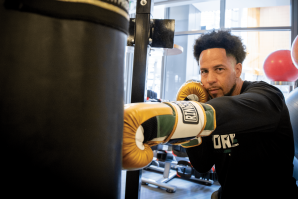
Giving Students a Fighting Chance With Combat U
When Dr. Luke Wood was finding his sea legs as Sac State’s new president, he walked over to Urijah Faber’s Ultimate Fitness gym on Folsom Boulevard, put on his boxing gloves and sparred with the gym owner. Then a light went off in Wood’s head. Since he was reinventing the university anyway, why not use the opportunity to partner with Faber in setting up a system so students could go to school for fighting?
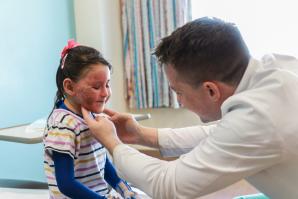
Once a Burn Patient, Now a Burn Surgeon
At Shriners Children’s, Dr. Jason Heard treats critically burned kids like he once was
In light of National Burn Awareness Week, Comstock’s presents a
story of hope and giving back.
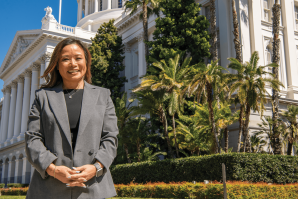
Legal Lions
Between the state Capitol, a federal courthouse and two top-ranked law schools, the Capital Region is a formidable hub for the legal industry
Between schools like McGeorge and UC Davis School of Law, as well as an array of respected firms, the state Capitol and various courts including a federal courthouse, the Sacramento region is a strong draw for the legal industry.
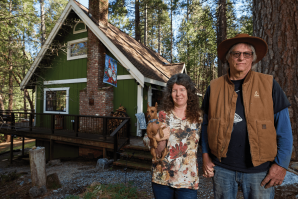
The Soaring Cost of Homeowners Insurance
High prices and carriers leaving the state send homeowners scrambling to protect their homes
California’s insurance crisis is damaging the housing market and more. Will legislators fix it before the next big blaze?

Fly Like an Eagle
The UC Davis California Raptor Center and the Department of Defense are teaming up to create the next generation of unmanned aircraft technology
The new center will utilize motion capture and photogrammetry — which uses photography to determine the distance between objects — to image birds in flight and create 3D models of the wing shapes that will help design uncrewed aerial systems, or UAS.
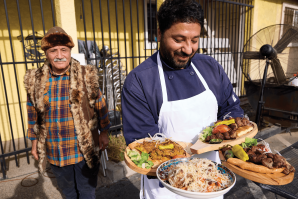
Photo Essay: Afghans Resettling in Sacramento
The Capital Region is home to more than 10,000 Afghan refugees who fled the Taliban. Comstock’s brings you a few of their stories.




